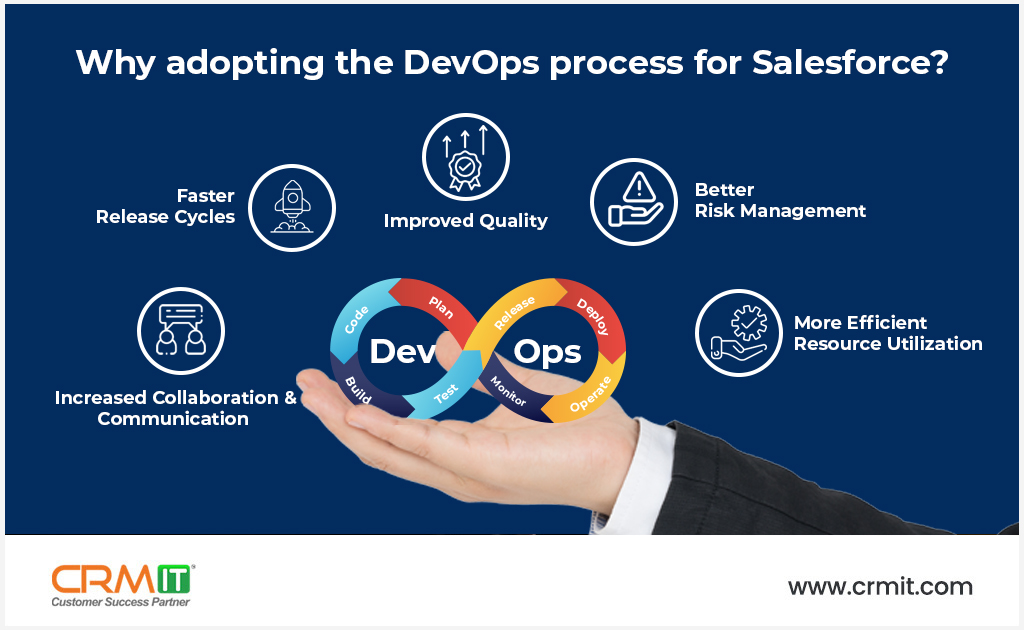Why adopting the Salesforce DevOps process has become a necessity? How does DevOps help?

Salesforce applications are becoming more complex, with more integrations and customization options available. This complexity makes it difficult for organizations to release new features and updates quickly and reliably. Additionally, as organizations scale and their user base grows, the need for a fast and reliable release process becomes even more critical. This is where DevOps comes in.
DevOps can help organizations automate many of the manual processes involved in Salesforce development, testing, and deployment. This automation can help to speed up the release cycle and improve the reliability of releases. Additionally, DevOps emphasizes collaboration and communication between teams, which can help to reduce errors and improve outcomes.
Before we dive into the benefits of DevOps for Salesforce development, let’s define DevOps. DevOps is a methodology that emphasizes collaboration, communication, and integration between software development and IT operations teams. It aims to break down silos between these teams, resulting in faster and more reliable software releases.
Benefits of Adopting a DevOps Approach for Salesforce Development:
- Increased Collaboration and Communication – One of the main benefits of adopting a DevOps approach for Salesforce development is increased collaboration and communication between teams. By breaking down silos between developers, operations teams, and other stakeholders, everyone can work together towards a common goal. This collaboration can help to reduce errors and misunderstandings, leading to more efficient development and better outcomes.
- Faster Release Cycles – DevOps can also help to speed up the release cycle for Salesforce applications. By automating many of the manual processes involved in releasing software, such as testing, deployments, and monitoring, organizations can release updates more quickly and with greater confidence. This can help businesses stay ahead of their competition by delivering new features and functionality to users faster.
- Improved Quality – Another benefit of DevOps for Salesforce development is improved quality. By automating testing and other quality control processes, organizations can catch errors and bugs earlier in the development cycle. This can help to reduce the risk of costly and time-consuming rework later on, resulting in a more reliable and higher-quality application.
- Better Risk Management – DevOps also offers better risk management for Salesforce development. By automating the deployment process and implementing proper monitoring and alerting, organizations can quickly identify and resolve issues that may arise during development or deployment. This can help to reduce the risk of downtime, data loss, and other issues that could impact users and business operations.
- More Efficient Resource Utilization – Finally, adopting a DevOps approach for Salesforce development can help to optimize resource utilization. By automating many of the manual processes involved in development, testing, and deployment, organizations can free up resources to focus on more valuable activities. This can result in more efficient use of time and resources, leading to better outcomes for the organization.
In conclusion, adopting a DevOps approach in Salesforce development has become a necessity due to the increasing complexity of applications and the need for faster and more reliable releases. DevOps can help organizations automate many of the manual processes involved in development, testing, and deployment, leading to faster releases and improved quality. Additionally, DevOps emphasizes collaboration and communication between teams, which can help to reduce errors and improve outcomes.
With many established vendor tools like Copado, Gearset, Flosum, AutoRABIT, and so on available in the market, plus Salesforce’s own DevOps center solution, it needs proper DevOps process and tools consideration to suit a particular business. Having the right strategy, efficient processes, an effective governance model, and optimal use of DevOps is critical.
CRMIT with its vast experience in this area has devised a toolkit on Salesforce release and DevOps maturity model to help customers to understand what exactly they need to build as part of the DevOps process and help them in the implementation journey in a phased and measurable manner to get the desired outcome.
Sudhir Dakshinamurthy
Tags: DevOps, Salesforce, Salesforce DevOps


